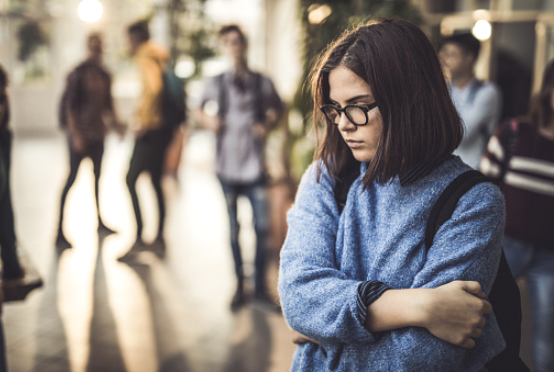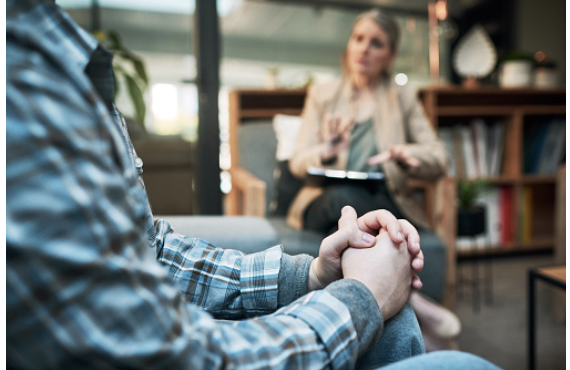Dealing with Social Anxiety: The world is not your enemy.
By: Sanjana Dash

Social anxiety is a common mental health condition second only to depression. There is nothing to feel ashamed about. You are not alone. Being constantly anxious, however, can be stressful. Here are some tips for better dealing with Social Anxiety.
Do you often get butterflies before presenting in front of your class or office? Getting ready for an important meeting or heading out requires you to use the restroom every 5-10 minutes. Breaking into cold sweats is typical for you. If so, you may be in for more than just social awkwardness. However, these may be mere symptoms of general Anxiety and not necessarily Social Anxiety. Before dealing with Social Anxiety, let us first understand what it really means and how can we better approach it.
What is Social Anxiety?
Social Anxiety is a mental health disability in which people constantly fear being judged by others while socialising or being out there in public places. At its core, it is the desire of certain people to go unnoticed for fear of being rejected. A regular thing like ordering food or interacting with colleagues or peers is difficult for people with Social Anxiety. They are always self-conscious and generally avoid being on the spot. Thus, causing a hindrance in their daily activities.

Symptoms of Social Anxiety
There is much more to Social Anxiety than shyness. It has an element, but things can be pretty serious if you cannot freely participate in the day-to-day activities.
Physical symptoms of Social Anxiety:
1) Blushing
2) Nausea
3) Excessive sweating
4) Trembling or shaking
5) Dizziness or lightheadedness
6) Rapid heart rate
7) Difficulty speaking
Psychological Symptoms of Social Anxiety:
1) Intense worrying about socialising or being in public places.
2) Mostly avoiding social gatherings.
3) Constantly in fear of people noticing your body language.
4) Low self-confidence.
5) Imagining all the worst possible scenarios.
6) Delving in negativity.

When to seek help?
There isn’t much awareness about Social Anxiety in our society. And this is why most people with this problem never seek help. And those who do, are often suggested to let this ‘phase’ pass.
But if you have a persistent fear in the following situations, you must consider seeking help from a professional.
1) You find it hard to make eye contact (you either look down or elsewhere rather than looking straight at the person in front of you)
2) Interacting with strangers is a big no for you (if a passerby asks you for directions, you start to mumble and then disappear)
3) Initiating conversations is a task for you (you often wait for the other person to start a conversation instead)
4) You are embarrassed to eat in front of people (you dislike eating in a public place for fear of being seen and judged)
5) You shy away from entering a room full of people (you tend to change your direction when you come across an occupied space)
A person with these symptoms must not be mistaken for an introvert. Introverts don’t tremble or get cold sweats while socialising. Instead, they dislike it.
How to deal with Social Anxiety?
Now that you know the difference between General and Social Anxiety, here are a few
Steps for Dealing with Social Anxiety:
Step 1: Start small. Challenge your negative thoughts.
Before a presentation or starting anything, your mind has already convinced you about the possible failure you will be. Begin by saying this out loud to yourself- “I will give my 100% no matter what”.
Step 2: Look around. Observe people around you.
Instead of looking down on yourself, look around you. Pay attention to what people are doing. Notice those small details. By this, you will focus more on your surroundings than your Anxiety.
Step 3: Focus on your breathing.
Anxiety directly affects the way we breathe. The first change in our body would be irregular breathing. Pause for a moment, sit straight, and keep taking deep breaths by closing your eyes. This will help you calm down and relax.
Step 4: Face your fears.
Instead of avoiding your fears, start facing them for a change. Start small, like interacting with your colleagues or asking your boss for leave. Set a goal- greet them with a ‘hello’ each day.
The aim here is to deal with Social Anxiety step by step. A ‘slow’ start is better than a ‘no’ start any day. Gradually practice these activities in your daily life. Be proud of your little achievements. And remember that you are not alone in this.
You can also join social groups like the Toastmasters Club – Toastmasters International teaches public speaking and leadership skills through a global network of clubs. These clubs have around 20 members who meet once a week for an hour.
Pursue your favourite hobbies. Join a dance class, or walk a dog. Go for whatever suits you best. Make an effort to venture out and enjoy life without fear.

Other techniques to adopt while dealing with Social Anxiety:
1) Decrease your caffeine intake– Coffee, soda, and other aerated drinks contain a high amount of caffeine that stimulates Anxiety. It’s better to either give up on these beverages or limit them to once a week.
2) Increase your physical activities– Religiously exercise at least five days a week for 30 minutes. The more active you get, the more in control you will be.
3) Include Omega-3 in your diet– Omega-3 fatty acids are beneficial for brain health and boost your mood. Fish like Salmon, Mackerel, Sardines contain these fatty acids. It is also found in seaweeds, walnuts, and flaxseeds.
4) Limit your alcohol intake– Often, people turn to alcohol to boost their confidence. But alcohol only increases Anxiety.
5) Improve your sleep schedule– You must get at least 7 hours of sleep daily. A good rest will activate the brain to function correctly.
6) Quit smoking– Nicotine may temporarily calm your nerves, but studies have proven it to be a self-destructor. Continued use of it will only increase your chances of getting an Anxiety attack.
If you don’t notice any changes after following the above self-help techniques, immediately consult a specialist.
Treatments
You receive personal guidance from a mental health counsellor by attending sessions and addressing your issues. The most common and preferred treatment is Cognitive Behavioural Therapy (CBT). CBT is quite a helpful tool to cope with Social Anxiety, Depression, Phobias, etc. However, you must be aware that your problem cannot vanish magically with CBT. The treatment will help you reduce your issue and deal with it more effectively.
Conclusion
Although Social Anxiety is a common mental health condition (next only to depression), several myths are associated with it that make it difficult to diagnose and treat. We live in a world where we are more connected today yet are lonelier, more depressed, and socially anxious. People with Social Anxiety desire to mingle, but their severe fear of rejection prevents them from doing so. There is a need for more education on dealing with Social Anxiety effectively.
References: https://bit.ly/3GoEehv, https://mayocl.in/3gnRpF9
Tags: Dealing with Social Anxiety, Mental Health, Social Anxiety,










It’s a very informative article about Social Anxiety. I didn’t know that it’s quite a disorder. Thank you 🙏
[…] you constantly worry and break out in cold sweats without knowing why. Persistent fear can point to anxiety. This can further lead to phobias, panic attacks, […]